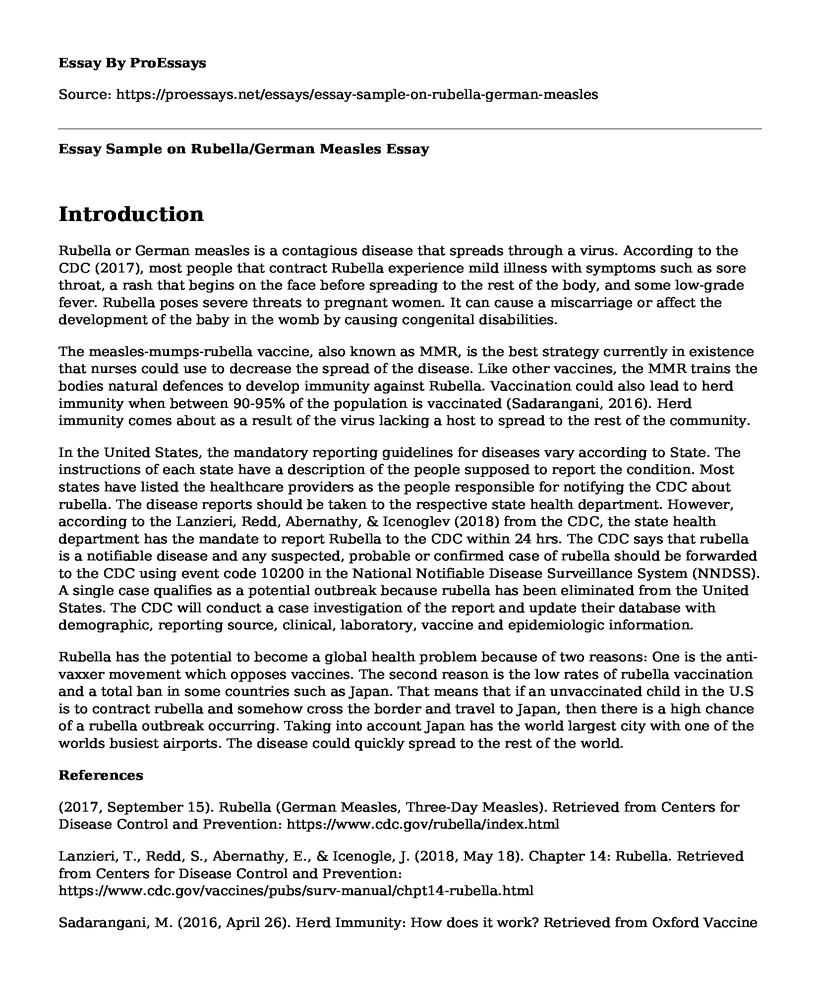Introduction
Rubella or German measles is a contagious disease that spreads through a virus. According to the CDC (2017), most people that contract Rubella experience mild illness with symptoms such as sore throat, a rash that begins on the face before spreading to the rest of the body, and some low-grade fever. Rubella poses severe threats to pregnant women. It can cause a miscarriage or affect the development of the baby in the womb by causing congenital disabilities.
The measles-mumps-rubella vaccine, also known as MMR, is the best strategy currently in existence that nurses could use to decrease the spread of the disease. Like other vaccines, the MMR trains the bodies natural defences to develop immunity against Rubella. Vaccination could also lead to herd immunity when between 90-95% of the population is vaccinated (Sadarangani, 2016). Herd immunity comes about as a result of the virus lacking a host to spread to the rest of the community.
In the United States, the mandatory reporting guidelines for diseases vary according to State. The instructions of each state have a description of the people supposed to report the condition. Most states have listed the healthcare providers as the people responsible for notifying the CDC about rubella. The disease reports should be taken to the respective state health department. However, according to the Lanzieri, Redd, Abernathy, & Icenoglev (2018) from the CDC, the state health department has the mandate to report Rubella to the CDC within 24 hrs. The CDC says that rubella is a notifiable disease and any suspected, probable or confirmed case of rubella should be forwarded to the CDC using event code 10200 in the National Notifiable Disease Surveillance System (NNDSS). A single case qualifies as a potential outbreak because rubella has been eliminated from the United States. The CDC will conduct a case investigation of the report and update their database with demographic, reporting source, clinical, laboratory, vaccine and epidemiologic information.
Rubella has the potential to become a global health problem because of two reasons: One is the anti-vaxxer movement which opposes vaccines. The second reason is the low rates of rubella vaccination and a total ban in some countries such as Japan. That means that if an unvaccinated child in the U.S is to contract rubella and somehow cross the border and travel to Japan, then there is a high chance of a rubella outbreak occurring. Taking into account Japan has the world largest city with one of the worlds busiest airports. The disease could quickly spread to the rest of the world.
References
(2017, September 15). Rubella (German Measles, Three-Day Measles). Retrieved from Centers for Disease Control and Prevention: https://www.cdc.gov/rubella/index.html
Lanzieri, T., Redd, S., Abernathy, E., & Icenogle, J. (2018, May 18). Chapter 14: Rubella. Retrieved from Centers for Disease Control and Prevention: https://www.cdc.gov/vaccines/pubs/surv-manual/chpt14-rubella.html
Sadarangani, M. (2016, April 26). Herd Immunity: How does it work? Retrieved from Oxford Vaccine Group: https://www.ovg.ox.ac.uk/news/herd-immunity-how-does-it-work
Cite this page
Essay Sample on Rubella/German Measles. (2022, Nov 16). Retrieved from https://proessays.net/essays/essay-sample-on-rubella-german-measles
If you are the original author of this essay and no longer wish to have it published on the ProEssays website, please click below to request its removal:
- China and India: Nations' Health Comparison
- Health Care Provider Work Hours and Sleep Deprivation Paper Example
- Healthy People 2020: Improving Health Outcomes for All Americans
- Essay Example on Advanced Practice Nurse Decides Zoloft for Severe Depression
- Essay Example on Record Thoughts: Family Morning Routine in Household of Five
- Essay Example on Nutrition & Diet Assessment: Identifying Deficiencies & Intervention Strategies
- Paper Example on Hypertension Management Among African Americans







